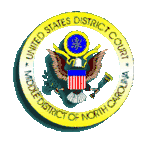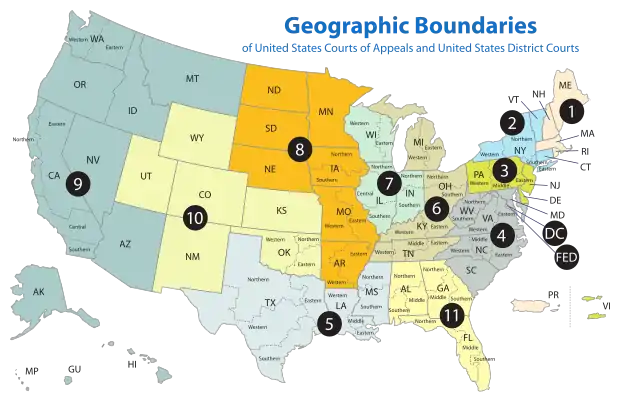| United States District Court for the Middle District of North Carolina | |
|---|---|
| (M.D.N.C.) | |
 | |
| Location | L. Richardson Preyer Federal Building More locations |
| Appeals to | Fourth Circuit |
| Established | March 2, 1927 |
| Judges | 4 |
| Chief Judge | Catherine Eagles |
| Officers of the court | |
| U.S. Attorney | Sandra J. Hairston |
| U.S. Marshal | Catrina A. Thompson |
| www | |
The United States District Court for the Middle District of North Carolina (in case citations, M.D.N.C.) is a United States district court with jurisdiction over 24 counties in the center of North Carolina. It consists of five divisions with a headquarters in Greensboro, North Carolina.
Appeals from the Middle District of North Carolina are taken to the United States Court of Appeals for the Fourth Circuit (except for patent claims and claims against the U.S. government under the Tucker Act, which are appealed to the Federal Circuit).
Jurisdiction
The U.S. District Court for the Middle District of North Carolina has jurisdiction over 24 counties: Alamance, Cabarrus, Caswell, Chatham, Davidson, Davie, Durham (excluding that portion of Durham County encompassing the Federal Correctional Institution, Butner, North Carolina), Forsyth, Guilford, Hoke, Lee, Montgomery, Moore, Orange, Person, Randolph, Richmond, Rockingham, Rowan, Scotland, Stanly, Stokes, Surry, and Yadkin.[1]
The district's jurisdiction was modified in 2021 to transfer the portions of four counties (Hoke, Moore, Richmond, and Scotland) containing Fort Bragg Military Reservation and Camp Mackall to the Eastern District of North Carolina.[2]
History
The United States District Court for the District of North Carolina was established on June 4, 1790, by 1 Stat. 126.[3][4] On June 9, 1794 it was subdivided into three districts by 1 Stat. 395,[4] but on March 3, 1797, the three districts were abolished and the single District restored by 1 Stat. 517,[4] until April 29, 1802, when the state was again subdivided into three different districts by 2 Stat. 156.[3][4]
In both instances, these districts, unlike those with geographic designations that existed in other states, were titled by the names of the cities in which the courts sat. After the first division, they were styled the District of Edenton, the District of New Bern, and the District of Wilmington; after the second division, they were styled the District of Albemarle, the District of Cape Fear, and the District of Pamptico. However, in both instances, only one judge was authorized to serve all three districts, causing them to effectively operate as a single district.[4] The latter combination was occasionally referred to by the cumbersome title of the United States District Court for the Albemarle, Cape Fear & Pamptico Districts of North Carolina.
On June 4, 1872, North Carolina was re-divided into two Districts, Eastern and Western, by 17 Stat. 215.[4] The Middle District was created from portions of the Eastern and Western Districts on March 2, 1927, by 44 Stat. 1339.[4] Shortly thereafter, President Calvin Coolidge appointed Johnson Jay Hayes by recess appointment to be the first judge of the Middle District of North Carolina.
Current judges
As of August 13, 2023:
| # | Title | Judge | Duty station | Born | Term of service | Appointed by | ||
|---|---|---|---|---|---|---|---|---|
| Active | Chief | Senior | ||||||
| 13 | Chief Judge | Catherine Eagles | Greensboro | 1958 | 2010–present | 2023–present | — | Obama |
| 11 | District Judge | William Lindsay Osteen Jr. | Greensboro | 1960 | 2007–present | 2012–2017 | — | G.W. Bush |
| 12 | District Judge | Thomas D. Schroeder | Winston-Salem | 1959 | 2008–present | 2017–2023 | — | G.W. Bush |
| 14 | District Judge | Loretta Copeland Biggs | Winston-Salem | 1954 | 2014–present | — | — | Obama |
| 8 | Senior Judge | Norwood Carlton Tilley Jr. | Greensboro | 1943 | 1988–2008 | 1999–2006 | 2008–present | Reagan |
Former judges
| # | Judge | State | Born–died | Active service | Chief Judge | Senior status | Appointed by | Reason for termination |
|---|---|---|---|---|---|---|---|---|
| 1 | Johnson Jay Hayes | NC | 1886–1970 | 1927–1957[Note 1] | — | 1957–1970 | Coolidge | death |
| 2 | Edwin Monroe Stanley | NC | 1909–1971 | 1957–1971[Note 2] | 1961–1971 | — | Eisenhower | death |
| 3 | L. Richardson Preyer | NC | 1919–2001 | 1961–1963[Note 3] | — | — | Kennedy | resignation |
| 4 | Eugene Andrew Gordon | NC | 1917–2002 | 1964–1982 | 1971–1982 | 1982–2002 | L. Johnson | death |
| 5 | Hiram Hamilton Ward | NC | 1923–2002 | 1972–1988 | 1982–1988 | 1988–2002 | Nixon | death |
| 6 | Richard Erwin | NC | 1923–2006 | 1980–1992 | 1988–1992 | 1992–2006 | Carter | death |
| 7 | Frank William Bullock Jr. | NC | 1938–present | 1982–2005 | 1992–1999 | 2005–2006 | Reagan | retirement |
| 9 | William Lindsay Osteen Sr. | NC | 1930–2009 | 1991–2006 | — | 2006–2007 | G.H.W. Bush | retirement |
| 10 | James A. Beaty Jr. | NC | 1949–present | 1994–2014 | 2006–2012 | 2014–2018 | Clinton | retirement |
- ↑ Recess appointment; formally nominated on December 6, 1927, confirmed by the United States Senate on January 9, 1928, and received commission the same day
- ↑ Recess appointment; formally nominated on January 13, 1958, confirmed by the Senate on February 25, 1958, and received commission on February 27, 1958
- ↑ Recess appointment; formally nominated on January 15, 1962, confirmed by the Senate on February 7, 1962, and received commission on February 17, 1962
Chief judges
Chief judges have administrative responsibilities with respect to their district court. Unlike the Supreme Court, where one justice is specifically nominated to be chief, the office of chief judge rotates among the district court judges. To be chief, a judge must have been in active service on the court for at least one year, be under the age of 65, and have not previously served as chief judge.
A vacancy is filled by the judge highest in seniority among the group of qualified judges. The chief judge serves for a term of seven years, or until age 70, whichever occurs first. The age restrictions are waived if no members of the court would otherwise be qualified for the position.
When the office was created in 1948, the chief judge was the longest-serving judge who had not elected to retire, on what has since 1958 been known as senior status, or declined to serve as chief judge. After August 6, 1959, judges could not become or remain chief after turning 70 years old. The current rules have been in operation since October 1, 1982.
Succession of seats
|
|
|
|
| ||||||||||||||||||||||||||||||||||||||||||||||||||||||||||||
U.S. attorneys for the Middle District
- Frank A. Linney (1927–1928)
- Edwin L. Gavin (1928–1932)
- John R. McCrary (1932–1934)
- Carlisle W. Higgins (1934–1947)
- Bryce R. Holt (1947–1954)
- Edwin M. Stanley (1954–1957)
- Robert L. Gavin (1957–1958)
- James E. Holshouser, Sr. (1958–1961)
- Lafayette Williams (1961)
- William H. Murdock (1961–1969)
- William Lindsay Osteen Sr. (1969–1974)
- N. Carlton Tilley Jr. (1974–1977)
- Benjamin H. White, Jr. (1977)
- Mickey Michaux (1977–1980)
- Kenneth W. McAllister (1981–1986)
- Robert H. Edmunds Jr. (1986–1993)
- Benjamin H. White, Jr. (1993)
- Walter C. Holton Jr. (1994–2001)
- Anna Mills Wagoner (2001–2010)
- Ripley Rand (2010–2017)
- Sandra J. Hairston (2017–2018)
- Matthew G.T. Martin (2018–2021)
- Sandra J. Hairston (2021–present)[5]
See also
- Courts of North Carolina
- List of current United States district judges
- List of United States federal courthouses in North Carolina
- United States District Court for the Eastern District of North Carolina
- United States District Court for the Western District of North Carolina
- Salisbury District, historic legislative district
References
- ↑ "NCMD Counties," http://www.ncmd.uscourts.gov/ncmd-counties.
- ↑ S.1340 - A bill to amend title 28, United States Code, to redefine the eastern and middle judicial districts of North Carolina.https://www.congress.gov/bill/117th-congress/senate-bill/1340
- 1 2 Asbury Dickens, A Synoptical Index to the Laws and Treaties of the United States of America (1852), p. 389.
- 1 2 3 4 5 6 7 U.S. District Courts of North Carolina, Legislative history, Federal Judicial Center.
- ↑ "PN1196 - Nomination of Sandra J. Hairston for Department of Justice, 117th Congress (2021-2022)". www.congress.gov. 2021-11-19. Retrieved 2021-11-24.
